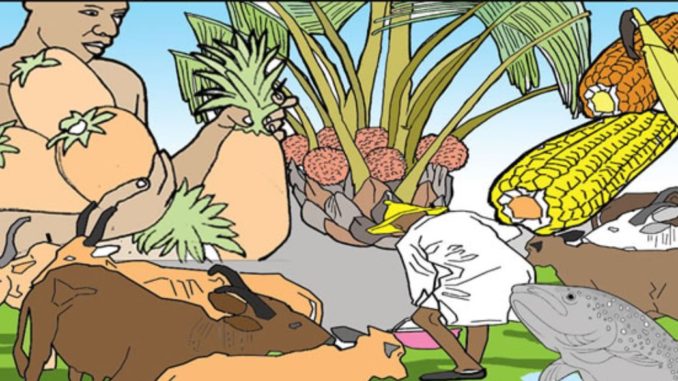
SEEMINGLY radical moves made recently to stimulate farming signpost both the Federal Government’s awareness of the urgency for food security and the lack of coherence and coordination in its diverse initiatives. President Muhammadu Buhari followed up the recent inauguration of a United States-backed $300 million initiative to boost investment in the sector with a controversial directive to the Central Bank of Nigeria to stop direct forex sales to importers of food. While all initiatives to reactivate the agriculture sector are welcome — and there are several — stringing all together as a holistic programme, consistency and dogged implementation are the only ways to guarantee success.
The Nigeria Agribusiness Investment Activity promoted by the US Agency for International Development, in partnership with the Federal Government, will work with lenders to attract investments in farming. Laudable as this and similar programmes are, the government needs, however, to muster greater sense of urgency and pursue a much more ambitious, integrated programme to achieve food security, create jobs and reduce poverty. Buhari’s directive to the CBN has been praised for its objective, but has been faulted by others for its lack of clarity and abruptness. It raises questions on the statutory independence of the CBN. It is also dodgy, being based on the contested premise that Nigeria has achieved food self-sufficiency.
The NAIA scheme, according to Vice-President Yemi Osinbajo, aims to reach 5,000 small and medium enterprises and facilitate greater opportunities for agribusiness to access credit and lenders to expand their agriculture sector portfolio. With effective synergy, USAID hopes it will help create a more favourable environment to attract investors and lure banks and other financial institutions into funnelling credit to farming.
Initiatives such as this are not lacking; they need, however, to be backed by the political will to see them through to the end, a coherent overall programme to meld the diverse schemes. Poor execution, inevitable corruption, especially when intervention funds are provided, and the elevation of politics above economic considerations by public sector managers have also shackled efforts. There have been some successes such as the rice revolution. But improved production in some crops has had minimal impact due to poor storage and lack of access roads. Some Nigerian crops like cassava have been rejected in foreign markets because of poor quality. The failure of the 36 state governments to fully buy in to the federal schemes and develop agricultural programmes of their own deepens the country’s food import dependency. The figure of N236.33 billion spent on importing food in the first quarter of 2019, or 6.4 per cent of total imports, belies Buhari’s claim.
A report by the US Department of Agriculture said Nigeria spent N504 billion on palm oil imports between 2014 and early this year. Once the world’s largest producer and exporter of palm oil, Nigeria today imports from Malaysia that launched its own palm oil programme in the 1960s. Palm oil sustained the defunct Eastern Region, cocoa, the defunct Western Region and groundnuts and cotton, the defunct Northern Region. The country was self-sufficient in food with a diversity of crops. The immediate past Minister of Agriculture and Rural Development, Audu Ogbeh, revealed in September 2018 that milk and tomato paste imports cost $1 billion and $300 million annually respectively.
The oil boom, accompanied by the collapse of the federal system into a unitary format in practice, stripped the atomised states of considerable autonomy, making them dependent on the centre, lacking in initiative and addicted to oil revenues. But agriculture demonstrates its resilience, contributing 24.4 per cent to Gross Domestic Product in the third quarter of 2017 compared to the 10.4 per cent contributed by oil and gas, which nevertheless provided 90 per cent of foreign earnings. The National Bureau of Statistics recorded 21.65 per cent contribution by agriculture in Q1 2018 and 22.86 per cent in Q2, compared to 9.61 per cent by oil in Q1 and 8.55 per cent in Q2. From about 50 per cent in 1991, 37 per cent of the country’s workforce were employed in the agriculture sector in 2018, estimates the International Labour Organisation, compared to less than two per cent in oil and gas. The UN’s Food and Agriculture Organisation declared: “Where per capita real income is low, emphasis is laid on agriculture and other primary industries.” Nigeria needs to target this high job-creating sector to reverse poverty.
Brazil, according to Britannica, is self-sufficient in basic food, world leader in coffee production, grows one-third of oranges and is the main supplier of cassava, stealing a march on Nigeria that is the world’s largest producer, but with poor export value. Nigeria should harmonise all its programmes, including the Anchor Borrowers’ Programme, Cassava, Cotton and credit schemes to take advantage of the $3 billion cassava export market that is currently dominated by Thailand that earned $1.19 billion from it in 2017, and the cocoa market where we were once world’s No.2 exporter.
There should be emphasis also on rural infrastructure, effective extension services, storage facilities and improving the road and rail networks to facilitate cheaper haulage costs. As president of Ghana, Jerry Rawlings accorded priority to rural infrastructure to overcome mass poverty and joblessness. Federal and state governments should move beyond lip service and pursue bold, but realistic agricultural programmes. One major drawback in national schemes is that, unlike the regions of the First Republic, states have left economic planning, and agriculture in particular, to the Federal Government, content to be “beneficiaries” of national schemes in line with the prevailing culture of sharing.
There should be a paradigm shift: the large army of unemployed youths are in the states, not in Abuja. Each should, like states, regions, provinces in every other federal polity, formulate coordinated economic policies, leveraging their respective advantages in agriculture and mining to attract local and foreign investors. Agriculture should be the bedrock of our economy and, together with mining, the basis of industrial take-off.
END

Be the first to comment